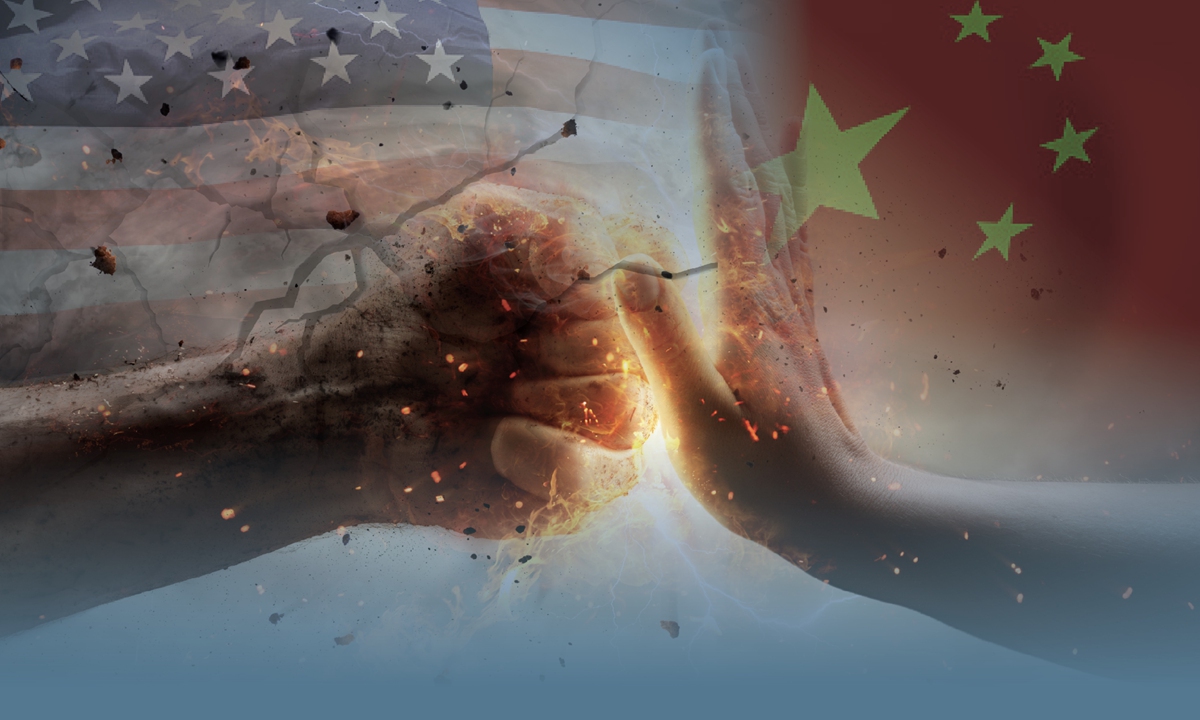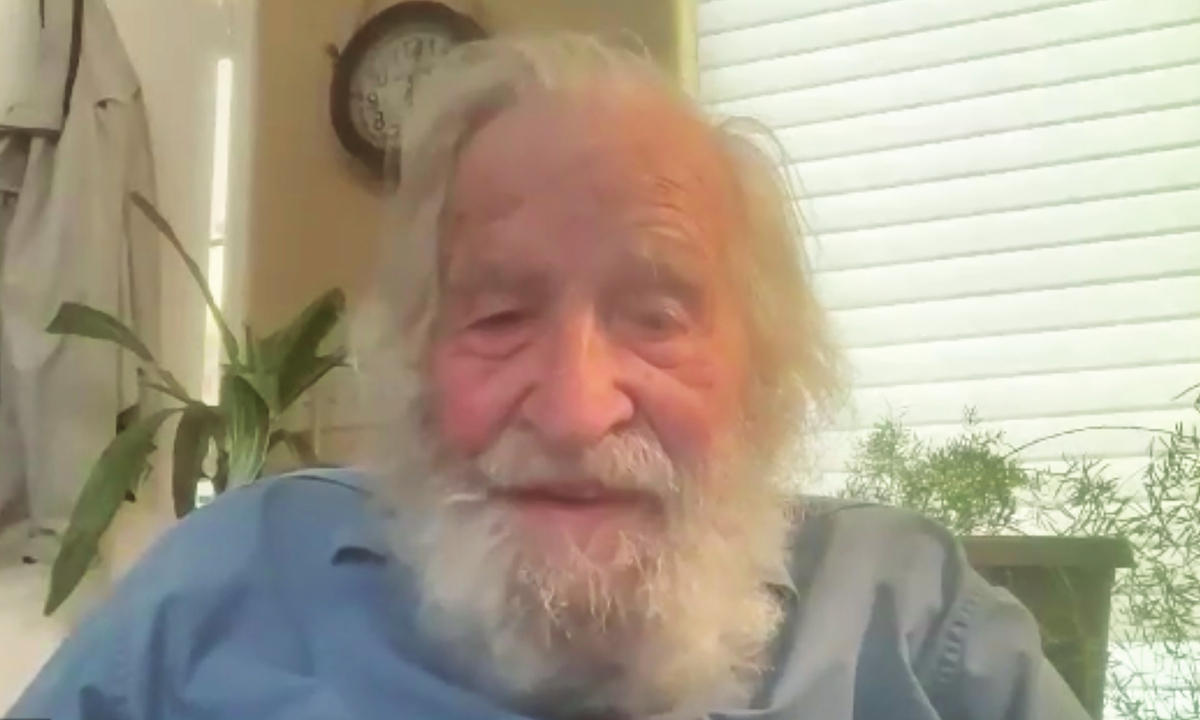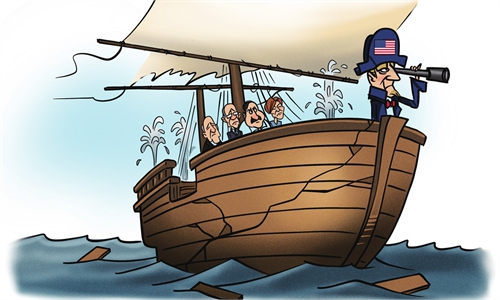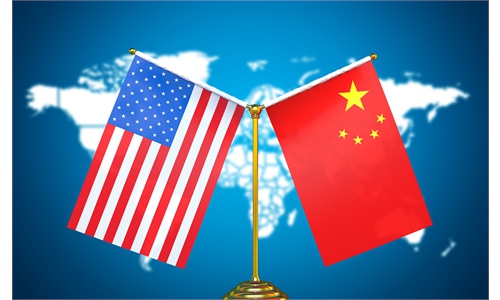
Photo: VCG
Editor's Note:At 94 years old, Noam Chomsky (Chomsky) is as vocal as ever. As a renowned American linguist and public intellectual, he constantly appears on the media talking about US foreign policy with his strong objection to war. In a recent interview with Global Times (GT) reporter Wang Wenwen, Chomsky shed light on US problems, China-US relations and the war in Ukraine.
GT: You are a linguist, but you have been involved in politics since youth. From Vietnam War to the current crisis in Russia and Ukraine, you are constantly making comments on the political situation and criticizing US foreign policy and the legitimacy of political authority in the US. This makes you a controversial figure in the US. What makes you so vocal?
Chomsky: It goes back to childhood. I wrote the first article in 1939, it was about the fall of Spain to Francisco Franco, and the spread of fascism over Europe. So why would I be critical of crimes? It's our responsibility, and is an elementary moral principle. We honor and respect people who criticize and condemn the crimes of their own state, not people who join in criticizing somebody else where it doesn't make any difference. It's an elementary principle that we focus our attention on what can make a difference.
GT: What are American strengths now?
Chomsky: There are many strengths. The US for one thing has been an unusually free society. That's one of the things that makes it easier to analyze and sometimes criticize American foreign policy than other countries.
The US once had the indigenous population who was slaughtered and expelled. It has empty territory, rich resources, a homogeneous population. The advantages are based on horrendous crimes. One is virtual extermination of the rich, indigenous cultures and societies. The other is the most hideous system of slavery that ever existed in human history, which is the basis for a lot of the country's wealth.
In 1945, the US took over the mantle of world dominance from Britain. Britain likewise had centuries of horrifying, horrendous crimes as it built the empire. As the US took over, it was going to do the same thing. That's what it means to be a hegemonic power. In 1947, the war department, which had existed since colonial times, was changed to the defense department. You didn't have to read Orwell to know that means from now on, or it isn't going to be any defense, just aggression. That's what it means to adopt the mantle of world leadership.
GT: And what problems does the US encounter now?
Chomsky: The security the US has is astonishing. It controls the hemisphere and both oceans. But there are internal problems, the country is tearing itself to shreds and social order is collapsing. The statistics are shocking. Just take the last 40 years which have been devastating for the society ever since Reagan. There's one major study from the Rand Corporation, a quasi governmental resource corporation that mostly works for the Pentagon. They did a study on what they call the transfer of wealth from the lower 90 percent of income level to the top 1 percent over the 40 years since Reagan, roughly $50 trillion, it's not small change.
It went along with destruction of the social order, collapsing of the limited benefit and welfare systems. Even if you look at things like incarceration rates, you go back to the 1970s, the United States was pretty much Europe. Now, it's 5 to 10 times.
That's the effect of the last 40 years of what's called neoliberalism. But it doesn't have much to do with what's the definition of neoliberalism. When you look up neoliberalism in the dictionary or an economics book, they'll say it's a commitment to free markets and small government. Policy is nothing like that. Government radically intervenes in markets, constant bailout of financial crashes, subsidies to major industries. Government continues to grow. Neoliberalism is just plain class war, has almost nothing to do with its dictionary definition.
The effects of that are severe, not just in the US. It's all over Europe and much of the world which had somewhat similar policies, a lot of anger, resentment, distrust of institutions. For good reasons, they don't do anything for it. And it has led to very dangerous consequences. It's a hurdle terrain for demagogues of the Donald Trump variety who can come in and say, I'll be your savior while he stabs you in the back. It's not a new phenomenon and takes me back to childhood in fact, unfortunately.

Noam Chomsky Photo: Screenshot
GT: What went wrong in the US' understanding of China?
Chomsky: Nothing. They understand it very well. There was actually an article recently in Australia, by Paul Keating, former prime minister and well-known international relations specialist. The article was about Australia. He says, why does Australia find China a threat? And he went through the various reasons. He finally ended up by saying the threat of China is that it exists. For the US, that's even more of a threat. It exists, doesn't follow orders and goes in its own path. There are plenty of crimes that you can mention, but that's not what bothers anyone. The US tolerates and supports much greater crimes.
You can bring up the crimes for doctoral reasons, but that's not the reason. The reason is, as Paul Keating said, it's there, follows its own path. It's not like Europe. The US imposes sanctions on some countries. Europe doesn't like them, but they obey. China doesn't obey, and that's not tolerable. If you're running the world, everybody has to obey.
The current policies towards China are outrageous. Secretary of Commerce, one of the sort of doves in the administration, Gina Raimondo once said that we have to enlist Europe in our campaign to make sure that China doesn't innovate. What kind of idiocy is that? We know China is way ahead of the rest of the world in renewable energy. So do we want to stop its innovation that creates the kinds of advanced technology which might save the world? It's beyond shocking, and there's no secret about it. This is publicly declared that it's committed to prevent China from economically developing. That's the opposite of what has to be done if we want to survive. China and the US have to cooperate, otherwise both will be destroyed.
GT: In an article on The Australian last year titled "A war with China or Russia means nice knowing you, goodbye civilisation," you wrote that a war against both Russia and China was "beyond insanity." Why did you say so? Why is the US engaged in such an insane move?
Chomsky: As I said, insanity. You can't have a war with either of them and expect to survive. You can't have wars between major powers. Even the country that carried out a first strike would itself be destroyed, even there was no retaliation, just by nuclear winter it's unthinkable. They must work together. This is the 2018 strategic policy, which was expanded under Biden. It's beyond insanity. However, if you look at history, states have not been interested in security, you can show that over and over. They're interested in power and the power of the dominant sectors within them. This goes back, as far as you look. They constantly sacrifice security. If you mean security of the population, that's not a high priority. It's unfortunately all too easy to demonstrate this.
So right now, their policy is aimed at maintaining US primacy and global order, the primacy of US-based multinationals. In fact, there is an interesting case right now, where usually the US government follows the policies advocated by the major corporate centers who have an overwhelming role in the government. But there are exceptions. And this is one of them. The US economic powers are not in favor of the confrontation. And in fact, some very interesting studies have come out in the Asian press about what's happening. Asia Times recently had a detailed economic analysis of trade flows between China, Vietnam, Mexico, and the US. It turns out that trade between the US and China has declined, but exports from China to the countries I mentioned have sharply increased and exports from them to the US have increased, which strongly suggests that US corporations have just found a way to make an end run around the trade sanctions, which they don't like. They don't want to lose the lucrative Chinese market.
It's not the only case. There are a number of interesting cases where state power and corporate power conflict. State is looking at longer-range interests. Corporations are looking at short-term profit. They sometimes conflict. There are others. They tell you a lot about how policy is actually carried out. They're not studied very much. It's not the kind of topic that specialists like to look at, but it's important ones.
If you look at what's happening in the world, the China-based investment and development and diplomacy programs are expanding. It's causing a lot of concern in high US diplomatic circles. Most recently in the Middle East, Saudi Arabia has been in the pocket of the US ever since the country was founded. It's now become a dialogue partner of the Shanghai Cooperation Organization. The United Arab Emirates, the second largest producer, too. The Iran-Saudi agreement was brokered by China as a major tag on US policy. These developments are part of a changing world order.
GT: As you predict, how will the Russia-Ukraine crisis end? Will it end in a way that the US and NATO desire?
Chomsky: Let's just look at the options and predict. Either there will be a diplomatic settlement, or there won't be. If there's no diplomatic settlement, two possibilities. Either they'll be a stalemate in which they grind each other down, one side or the other will capitulate. Which side is going to capitulate? It's not going to be Russia. Russia has ultimate weapons if it's ever under threat, it can always escalate without limit. Is Ukraine going to capitulate? No, as long as the US carries out the war. The US also has ultimate weapons. So the only answer that is not horrific is a diplomatic settlement.
The US at the moment doesn't want that. It claims that we have to continue the war to weaken Russia as they put Ukraine in a better negotiating position. But why should Ukraine be in a better negotiating position as the war goes on? Even if it were, does it make any difference? If Russia were to face defeat, it can escalate without limits.
The only one hope, I think, is the Chinese program that was proposed a couple of weeks ago and was dismissed by the US, but it shouldn't have been. That doesn't answer everything by any means, but it's based on the principle, the integrity of every territory must be preserved, including Ukraine, as Chinese officials emphasized. That's a strong principle. It seems to me a starting point, not the end.
Diplomacy is going to be very difficult. The longer the war goes on, the harder it gets. There were diplomatic possibilities in February 2022, right before the invasion, something on the order of the Minsk agreements, which are not just local agreements, they were supported by the UN Security Council unanimously. So that's a high level international support. Basic outline was Ukraine would not join NATO, but have a neutral status like Austria during the Cold War. It would have some sort of federal structure may be like Switzerland or Belgium in which the eastern Russia-oriented regions with a degree of autonomy.
That was a possible solution up until the outbreak of the war. Actually, the one statesman in the world who was pressing for it was Emmanuel Macron. Of course he's vilified for it, but he was doing the right thing.
GT: What do you think of the concept of the China-proposed human community with a shared future?
Chomsky: That's exactly what we must do. When the Soviet Union collapsed, Mikhail Gorbachev proposed what he called a common European home from Lisbon to Vladivostok with no military alliances, no victors and defeated, common efforts to create a kind of social democratic future that would lead this Eurasian common home to be in close relations with China to its east.
There are repeated points in history where there are ways to move towards what you just described there. Our interests block them. Populations should be pressing for them and can make progress in that direction. Furthermore, they have to do it, or we're all going to be destroyed. There are no boundaries to environmental destruction. There are no boundaries to likely pandemics, no boundaries to nuclear war. So there must be accommodation.



